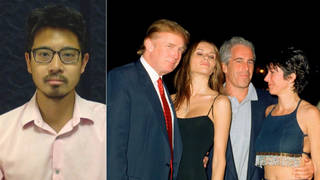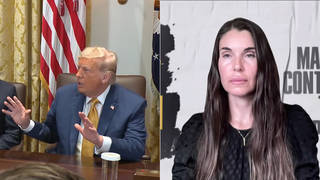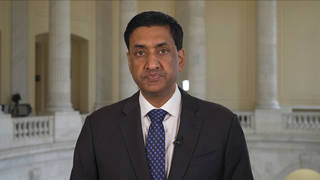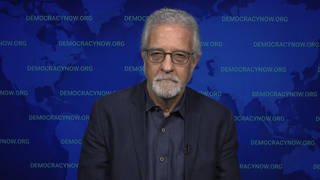
We speak with award-winning journalist and author Naomi Klein about the nomination of Paul Wolfowitz, one of the administration’s top neoconservatives and a chief architect of the invasion of Iraq. [includes rush transcript]
- Naomi Klein, award-winning journalist and author of “Fences and Windows: Dispatches From the Front Lines” of the “Globalization Debate and No Logo: Taking Aim at the Brand Bullies.” She just met with Giuliana Sgrena in Rome.
Transcript
AMY GOODMAN: We’re talking to independent reporter, Naomi Klein, who has just returned from Rome where she met with Giuliana Sgrena in her hospital room. You came to the United States from Canada now for the 40th anniversary of the Vietnam teach-ins and spoke last night in Washington. One of the things you talked about, Naomi, was the nomination of Paul Wolfowitz, the Deputy Defense Secretary, to become President of the World Bank. Can you talk about the significance of this appointment?
NAOMI KLEIN: Well, I think it’s tremendously significant in the sense that the World Bank is something of a contested institution. There are very real power struggles within the World Bank between people who do genuinely believe that the World Bank is a — should be and institution devoted to direct poverty alleviation programs, AIDS treatment, sanitation, other health care programs, education, and then the ideologues, the people who still adhere to what’s called the “Washington Consensus,” the idea that the way you deal with poverty and the way you encourage development is by forcing poor countries to adopt very radical free market policies, the centerpiece of which is privatization of basic services like water, electricity, and essentially, that the goal of the World Bank is to loan countries money, fund mega-projects that will attract multinational corporations. And then the development, the aid will happen in the trickle-down. And I think the significance of Wolfowitz’s appointment is that within the World Bank, the ideologues were losing, because the so-called Washington Consensus or neoliberal economics has really been in crisis, particularly in Latin America, where you have a continent-wide rejection of the policies of privatization and deregulation. You have left governments being elected across the continent. You have neoliberal governments being thrown out, escaping in helicopters in Bolivia, Argentina, and a real move towards rethinking the logic of these policies, precisely because they created tremendous wealth, tremendous growth for the past 15 years, but that did not translate into poverty alleviation. In fact, you have, in Latin America, many more people living in poverty. So the appointment of Wolfowitz in this context is a very clear message from the Bush administration. They’re sending in one of their top ideologues, somebody who is a true believer in the so-called Washington Consensus, and we know this because Wolfowitz was, of course, the architect of the postwar plan, such as it was, in Iraq, which was itself a radical experiment in precisely these policies. Wolfowitz oversaw the move to privatize Iraq’s entire economy, to fire 500,000 state employees, based on this same thinking, that if Iraq becomes a utopia for foreign corporations, then everything else will be solved in the trickle-down. And of course, in fact, what happened in Iraq is these radical economic policies led to the feeding of the armed resistance. Many people who were laid off by Paul Bremer under Paul Wolfowitz’s supervision joined the armed resistance.
AMY GOODMAN: Naomi Klein, I want to thank you very much for being with us, independent reporter, speaking to us from Washington, D.C. We are also going to post on our website Jeremy Scahill’s piece in The Indypendent called “Checkpoint Killings Unchecked.”













Media Options